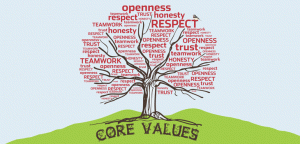Your Values
You will come to your teenage years with beliefs and values. The natural challenge on the teenage journey is to challenge them, given your new mental capabilities and awareness of the world around you – and drive to become your own person. You develop your teenage values and then they continue to evolve over time.
This doesn’t mean a wholesale rejection of childhood beliefs and values. We usually keep most of the key beliefs and values, and strengthen them by having challenged them. But, you can also add some new ones, and let some go. The critical point is that they become truly your beliefs and values and can then guide you and support you in life.
It may not be a straight path as there is often a lot of experimenting and testing and confusion, which can last for quite a while. Sometimes we reject a belief or value and then later recommit to it. Remember, it’s a journey and the key is to reflect and explore and test.

Two Natural Pitfalls
The heroic journey is about being the author of your life – taking responsibility for creating your life. That means critically examining all the values that swirl around you and determining which ones are right for you and which ones are not. That can be tough when you decide that some of your values are not exactly those of people or groups that are important to you.
Pitfall #1 – Just Accepting Others’ Values
Lots of people have values that influence you. That’s just the way the world works. Your parents have values. Your faith community has values. Your neighborhood and nation have values. Your school has values. Teams that you are on or organizations of which you are a part have values.
These values may be similar or there may be a good deal of conflict between them. These values may be forcefully presented to you or they may simply exist in your world and exert less direct influence. Usually it’s a mix.
The pitfall is in simply accepting these values without asking if they are right for you. Many of them will be right for you. Some will not be right for you and it can be intimidating to adopt values that are different than those around you.
Pitfall #2 – Just Rejecting Others’ Values
The other pitfall is the opposite – just rejecting the values of others in your world. The classic rejection is rejecting the values of your parents because they are your parents and you need to be your own person. It’s also common to question your faith community and explore options.
Questioning and exploring is natural and healthy, but simply rejecting a set of values because they are someone else’s is a pitfall. It is not about being the author of your life and committing to a value. It is simply being reactive – reacting against a value vs. committing to one.
“Absorb what is useful, reject what is useless, add what is specifically your own.”
Bruce
Lee
Things you Might Value
There is an amazing range of things that you might value. The following list is a little over the top, but it illustrates just how wide that range is – even though some of these terms are close in definition. It does show just how many things we might value about ourselves – or others. One of the worksheets asks you to identify the top 20 things you value, then the top ten and finally the top 5. That can be surprisingly hard, but it does provide an interesting profile.
|
|
|
"Try not to become a (person) of success but rather try to become a (person) of value."
Albert
Einstein
Animation Example for the “My Value Set” Worksheet
Your Values During Tough Times on the Journey
Having a good sense of your values can provide a strong foundation for weathering tough times. They can not only guide decisions and actions, but they can also remind you of why you are important – you are the carrier of values that make a difference. Tough times usually don’t last (even though they sometimes can drag on), but your set of values will. So will your sense of significance, your sense of purpose and your personal qualities.